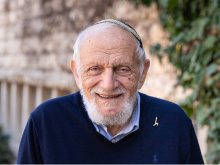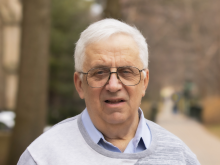Prix Abel 2020 à Hillel Furstenberg et Gregory Margulis
Le Prix Abel 2020 a été attribué à Gregory Margulis et Hillel Furstenberg pour l’introduction et le développement d’approches probabilistes et dynamiques novatrices de problèmes de théorie des groupes, théorie des nombres et combinatoires.
Gregory Margulis a étudié les groupes de Lie (les "symmétries continues") et a établi des propriétés de rigidité spectaculaires pour ces objets et certains de leurs sous-groupes. Ses méthodes mêlent géométrie, systèmes dynamiques et combinatoire.
Un de ses résultats les plus frappants est peut-être la preuve en 1986 de la conjecture d'Oppenheim. Celle-ci affirme la possibilité d'approcher zéro par toute expression quadratique en au moins trois variables entières, sauf impossibilité évidente. La stratégie de Margulis résout ce problème d'arithmétique en le transformant en un problème de dynamique "en rang supérieur" qu'il résout à son tour en établissant un phénomène de rigidité dû à ce rang supérieur.
L’un des résultats marquants de Hillel Furstenberg est le « Principe de correspondance de Furstenberg » (1977) qui crée un pont entre la théorie ergodique (les théorèmes de récurrence) et la théorie combinatoire des nombres (théorie de Ramsey). Ce principe lui a permis de donner une nouvelle et spectaculaire preuve au théorème de Endre Szemeredi (Prix Abel 2012) sur les progressions arithmétiques pour les ensembles d’entiers à densité positive. Par la suite l'approche sera utilisée et enrichie par B. Green et T. Tao pour montrer l'existence de progressions arithmétiques arbitrairement longues dans l'ensemble des nombres premiers.
Ci-dessous, le communiqué officiel de l'académie des sciences de Norvège :
The Norwegian Academy of Science and Letters has decided to award the Abel Prize for 2020 to Hillel Furstenberg, Hebrew University of Jerusalem, Israel and Gregory Margulis, Yale University, New Haven, CT, USA.
“for pioneering the use of methods from probability and dynamics in group theory, number theory and combinatorics”
Hillel Furstenberg and Gregory Margulis invented random walk techniques to investigate mathematical objects such as groups and graphs, and in so doing introduced probabilistic methods to solve many open problems in group theory, number theory, combinatorics and graph theory. A random walk is a path consisting of a succession of random steps, and the study of random walks is a central branch of probability theory.
“The works of Furstenberg and Margulis have demonstrated the effectiveness of crossing boundaries between separate mathematical disciplines and brought down the traditional wall between pure and applied mathematics,” says Hans Munthe-Kaas, chair of the Abel committee.
He continues: “Furstenberg and Margulis stunned the mathematical world by their ingenious use of probabilistic methods and random walks to solve deep problems in diverse areas of mathematics. This has opened up a wealth of new results, such as the existence of long arithmetic progressions of prime numbers, understanding the structure of lattices in Lie groups, and the construction of expander graphs with applications to communication technology and computer science, to mention a few.”

Hillel Furstenberg
Hillel Furstenberg was born in Berlin in 1935. His family was Jewish and they managed to flee from Nazi Germany to the U.S. in 1939. Sadly, his father did not survive the journey, and Furstenberg grew up with his mother and sister in an orthodox community in New York.
When he published one of his early papers, a rumor circulated that he was not an individual but instead a pseudonym for a group of mathematicians. The paper contained ideas from so many different areas, surely it could not possibly be the work of one man? Following a career in mathematics at several universities in the U.S., he left the country in 1965 for the Hebrew University of Jerusalem, where he stayed until his retirement in 2003. Spending most of his career in Israel, he helped establish the country as a world center for mathematics.
Furstenberg has won the Israel Prize and the Wolf Prize.

Gregory Margulis
Gregory Margulis was born in Moscow in 1946. From early on he showed a unique talent in mathematics. In 1978, he won the Fields Medal at only 32 years old but was unable to receive the medal in Helsinki since the Soviet authorities refused him a visa.
He was one of the top young mathematicians in the Soviet Union but was unable to find a job at Moscow University as he faced discrimination for being of Jewish origin. Instead, he found work at the Institute for Problems in Information Transmission. He was only allowed to travel abroad in 1979 when Soviet academics were given more personal freedoms. During the 1980s he visited academic institutions in Europe and the U.S. before settling at Yale in 1991, where he has been ever since.
Margulis is a winner of the Lobachevsky Prize and the Wolf Prize.
Due to the ten years age difference and the travel restrictions of the Soviet authorities, the laureates did not formally collaborate, however, they influenced each other’s work.
En savoir plus sur le prix

